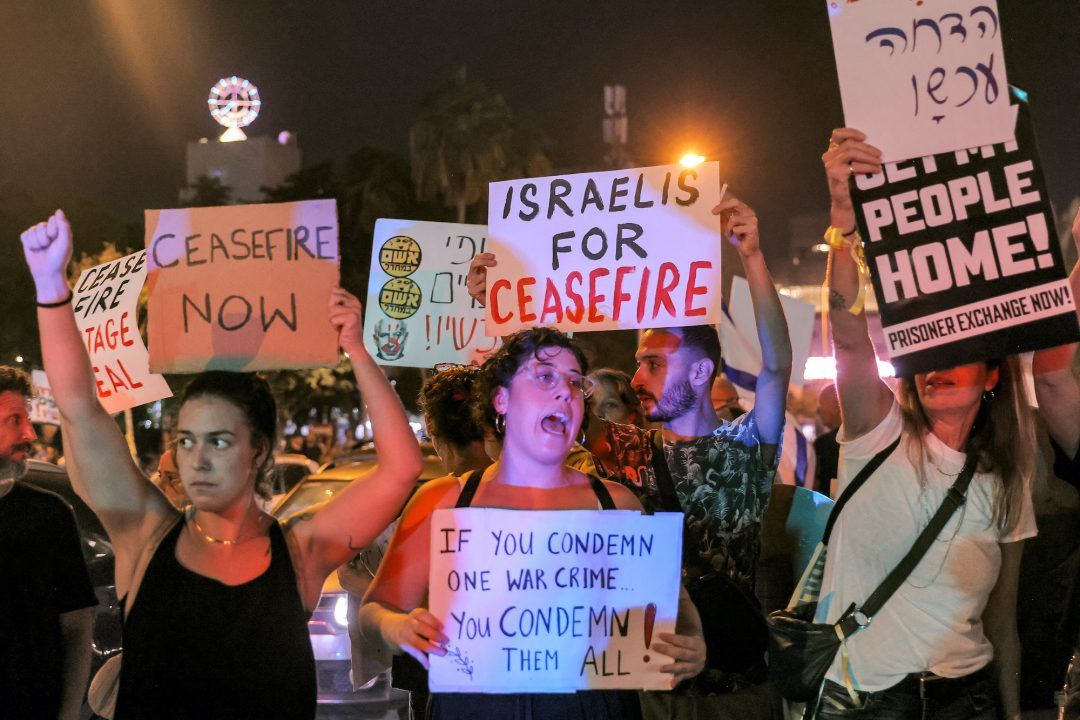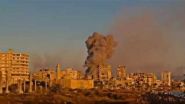- Home
- War in the Middle East
- Are Gaza Ceasefire Talks Dead?

©People gather with signs calling for a ceasefire during a protest for the release of hostages held by Palestinian militants since the October 7 attack, near the Israeli defense ministry headquarters in Tel Aviv on October 28, 2023. (Photo by Ahmad Gharabli / AFP)
With Ismail Haniyeh killed, regional tensions escalating, and the latest round of talks stalling, are ceasefire hopes now dead?
The killing of Hamas's political leader in an attack blamed on Israel has prompted fears of a wider regional conflict and sidelined talks aimed at ending the nearly 10-month war in Gaza.
With the United States and Egypt, Qatar has led months of behind-the-scenes talks aimed at securing an additional truce, beyond a one-week pause in November when scores of Israeli and foreign hostages were released in exchange for Palestinian prisoners.
But in the hours after Haniyeh's killing in Tehran, Qatar's Prime Minister Sheikh Mohammed bin Abdulrahman Al-Thani on Wednesday questioned the success of future talks.
"How can mediation succeed when one party assassinates the negotiator on the other side?" he asked.
Before Haniyeh's killing, Hamas had accused Israeli Prime Minister Benjamin Netanyahu of delaying a possible Gaza ceasefire.
As Egyptian, Qatari, and US mediators met with Israeli negotiators one week ago in Rome, the militants said Israel presented new conditions for a deal in a step backwards from its previous position.
United States President Joe Biden outlined in late May what he called an Israeli initiative for a truce and hostage release deal, and this became the basis for subsequent talks.
US news site Axios reported, citing two Israeli officials, that Saturday talks in Cairo had stalled, concluding without a breakthrough. Qatari negotiators were not present.
"Even before the killing of Haniyeh, in the last couple of weeks, the Israeli government, Netanyahu in particular, didn't give the mediators any confidence," said Middle East expert Andreas Krieg, a senior lecturer in security studies at King's College London.
"The killing of Haniyeh and the escalation in Beirut as well do not suggest Israel is sincerely interested in a ceasefire," he added.
In the aftermath of October 7, Haniyeh played a critical role in talks with mediators in Qatar, where Hamas's political office has been based since 2012 with the blessing of the United States.
"Haniyeh was of course the chief negotiator; ... [he] was, in a way, a bridging figure, was pragmatic, wanted to get a deal done... who seemed to be acting in good faith," said Joost Hiltermann, the director of International Crisis Group's Middle East programme.
Krieg said Haniyeh was "able to unlock some of the difficulties during the mediation process, and that could certainly be an asset that has been lost with him being killed."
However, that does not mean "that his killing completely upended any sort of mediation, perhaps not in the short term, but in the medium term."
Iran and its allies in the so-called "axis of resistance" have vowed to respond to last week's killings.
Hiltermann said that in a worst-case scenario with significant casualties on the Israeli side, "all bets are off" on further Gaza truce talks.
"Then we're in an escalatory cycle that is very dangerous and in the midst of which there won't be any hostage release talks or ceasefire talks."
One possible outcome of an escalation in Lebanon, Krieg said, was pressure on Israel to make concessions as it was "not ready for that war" and would "need to free up resources and assets that are now tied down in Gaza."
But Krieg said, "In the very short term... for this month of August, I think mediation and negotiation are probably dead."
Callum Paton, with AFP
The killing of Hamas's political leader in an attack blamed on Israel has prompted fears of a wider regional conflict and sidelined talks aimed at ending the nearly 10-month war in Gaza.
With the United States and Egypt, Qatar has led months of behind-the-scenes talks aimed at securing an additional truce, beyond a one-week pause in November when scores of Israeli and foreign hostages were released in exchange for Palestinian prisoners.
But in the hours after Haniyeh's killing in Tehran, Qatar's Prime Minister Sheikh Mohammed bin Abdulrahman Al-Thani on Wednesday questioned the success of future talks.
"How can mediation succeed when one party assassinates the negotiator on the other side?" he asked.
Where do the talks stand?
Before Haniyeh's killing, Hamas had accused Israeli Prime Minister Benjamin Netanyahu of delaying a possible Gaza ceasefire.
As Egyptian, Qatari, and US mediators met with Israeli negotiators one week ago in Rome, the militants said Israel presented new conditions for a deal in a step backwards from its previous position.
United States President Joe Biden outlined in late May what he called an Israeli initiative for a truce and hostage release deal, and this became the basis for subsequent talks.
US news site Axios reported, citing two Israeli officials, that Saturday talks in Cairo had stalled, concluding without a breakthrough. Qatari negotiators were not present.
"Even before the killing of Haniyeh, in the last couple of weeks, the Israeli government, Netanyahu in particular, didn't give the mediators any confidence," said Middle East expert Andreas Krieg, a senior lecturer in security studies at King's College London.
"The killing of Haniyeh and the escalation in Beirut as well do not suggest Israel is sincerely interested in a ceasefire," he added.
Haniyeh's role in talks?
In the aftermath of October 7, Haniyeh played a critical role in talks with mediators in Qatar, where Hamas's political office has been based since 2012 with the blessing of the United States.
"Haniyeh was of course the chief negotiator; ... [he] was, in a way, a bridging figure, was pragmatic, wanted to get a deal done... who seemed to be acting in good faith," said Joost Hiltermann, the director of International Crisis Group's Middle East programme.
Krieg said Haniyeh was "able to unlock some of the difficulties during the mediation process, and that could certainly be an asset that has been lost with him being killed."
However, that does not mean "that his killing completely upended any sort of mediation, perhaps not in the short term, but in the medium term."
Will Iranian retaliation affect talks?
Iran and its allies in the so-called "axis of resistance" have vowed to respond to last week's killings.
Hiltermann said that in a worst-case scenario with significant casualties on the Israeli side, "all bets are off" on further Gaza truce talks.
"Then we're in an escalatory cycle that is very dangerous and in the midst of which there won't be any hostage release talks or ceasefire talks."
One possible outcome of an escalation in Lebanon, Krieg said, was pressure on Israel to make concessions as it was "not ready for that war" and would "need to free up resources and assets that are now tied down in Gaza."
But Krieg said, "In the very short term... for this month of August, I think mediation and negotiation are probably dead."
Callum Paton, with AFP
Read more



Comments